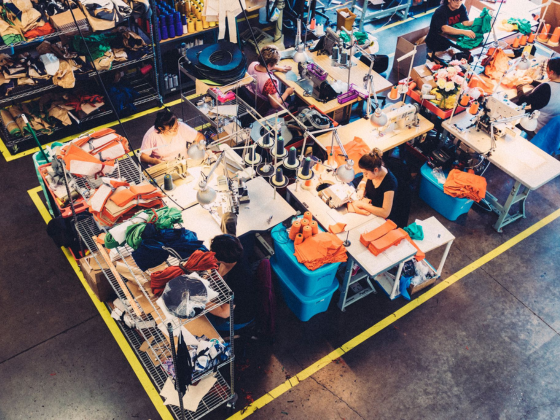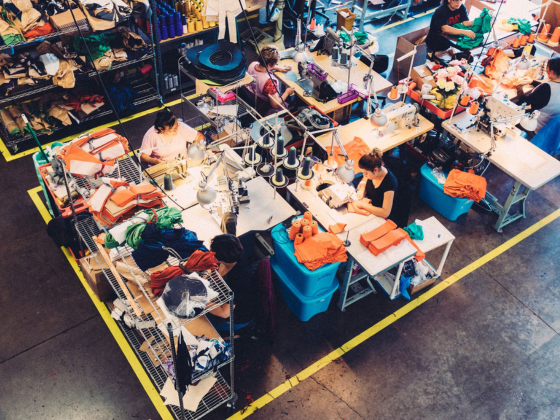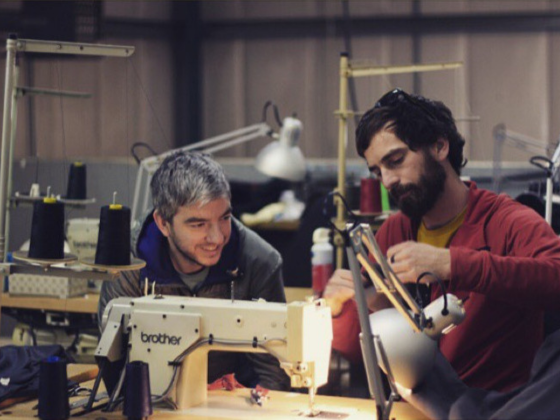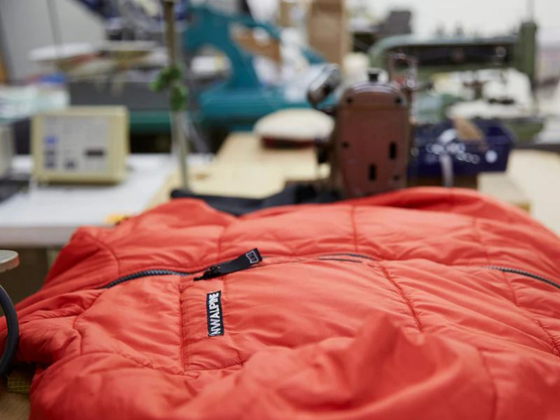The goal of our current American economic system has become to extract as much money as possible from the lower and middle classes for the benefit of Wall Street and the ultra wealthy. There’s a massive gulf between the vast majority of Americans and the wealthiest among us. There are around 233,000 Americans with a net worth over $30 million. That’s .07% of our total population. The top 1% of Americans (3.3 million people) own 30% of all wealth in this country. The bottom 50% (167 million people) own 2.6% of all wealth. The median net worth of all Americans is $193,000. This level of wealth inequality is unconscionable and not sustainable. A responsible company should be doing everything it can to support lower income workers in their communities. Instead, we’re seeing some brands take offshoring to the next level, beyond just production and customer service, by sending traditionally white collar work like business operations, accounting, etc. to be done by lower wage workers in other countries, further hollowing out the middle class and driving more wealth to the top.
For thirty years academic economists have laid the intellectual justification for globalization and argue that “lower value” production jobs should go overseas and Americans will be free to pursue other work of “greater value”. But economists that influence policy largely come from a handful of elite academic institutions, have never held jobs outside of academia, and come from backgrounds where they rarely come into meaningful contact with lower income Americans. Ultimately their jobs are to provide cover for Wall Street and multinational corporations (businesses led by their classmates at the elite colleges and universities they attend) regardless of what that means for the vast majority of Americans.
In the mainstream economist’s view, access to cheap goods is all that should matter to Americans. Globalization has transformed our economy so that Instead of being employed making products that are then sold to fellow Americans, a huge number of people are employed by the country’s largest retailers working to stock and sell goods that are largely made overseas. Together, Target, Walmart, Costco and Amazon employ over 3 million people in the US. Astoundingly, 29% of all workers work in the gig economy, driving for ride sharing apps, delivering food, etc.
This system is tearing our country apart at the seams and we desperately need to find meaning as a society again. Humans are hardwired to care about, and for, each other. When we outsourced production of the goods that are necessary to make our society run, we outsourced our ability to take care of each other. It wasn’t just jobs that were lost. There’s a sense of pride and meaning when you’re making products for your fellow citizens that is no longer there. An economy isn’t an abstract thing that exists outside of our lives to be studied, measured and tweaked. The problem with economists is that they cannot measure what actually makes a person satisfied with their lives. They cannot measure people’s greatest wants, dreams, desires and individual goals. The sum total of our economic lives. Ultimately, In order to have a successful country we must have an economy that provides meaningful work for everyone.
We often want to turn to the government and politicians to solve our problems, but in the case of radical change they are incapable of addressing our fundamentally broken system because all of the incentives that drive their actions call for maintenance of the status quo. We can’t wait for the government to do it, so how can we create an economy that works for everyone?
As people who buy things, we can start by making a commitment to buy from locally owned companies, and preferably those that make their products in the United States. (It’s always better to buy from a small business than a large corporation no matter where the products are made). This is not an all-or-nothing deal. It would be very difficult, time consuming, and unrealistic to completely cut out large corporations from our spending. However, in the example of apparel, if enough people committed to spending even 10% of their clothing budget on made in USA apparel, it would mean a sea change for the industry. If only 2.5% of apparel currently sold in the US is made here, small increases would equate to huge gains.
When your factory is owned by your neighbor there are obligations to one another that don’t necessarily come into play when working with overseas factories. American companies must follow American wage, labor and environmental rules.
The environmental benefits of domestic production can’t be overstated. As an example, two of the mills we buy fabric from are located in the city of Los Angeles, California, home to some of the most stringent environmental laws in the world. While these mills and dye houses have systems in place to reclaim all the water they use. It’s a lot easier to pollute someone else’s river halfway across the world, than the one in your backyard where your neighbors might get a tad pissed off to wake up one day to a waterway dyed pink.
Overproduction is the most environmentally damaging issue in apparel production. An estimated 40% of apparel made globally is not sold and ends up being dumped in developing nations or goes straight into a landfill (see the giant pile of clothes in Chile that can be seen from space). That’s an astounding waste of resources that is only possible because the externalities (costs that businesses don’t pay for) from producing overseas are being borne by the poorest workers on the planet. In domestic factories, because workers are being paid fairly and factories must follow rules and regulations that brands ultimately pay for, overproduction cannot happen. If 40% of what a brand produced was not sold, they would quickly be out of business.
What really radicalized my belief in the transformative nature of local manufacturing was the potential I experienced when we operated our factory, Kichatna Apparel Mfg. We produced tens of millions of dollars worth of apparel and paid millions of dollars in wages directly into our community. Had the brands we manufactured products for made their stuff overseas, all that money would have flowed to Vietnam or China and would have never touched the lives of our neighbors.
Historically, the labor portion of the cost of goods sold (the cost of all inputs that go into a product) has been the portion of the sale price of a product that went to the workers in our country who made those products. Offshoring broke that agreement and transferred a much smaller portion of the sale price of a product to an overseas factory, and the owners and shareholders kept the rest for themselves. If you want to understand wealth inequality it is pretty simple.
Entrepreneurship should be the pathway to a better life for far more Americans, but as huge businesses have become oligopolies and monopolies, it is so much harder for small competitors with limited resources to enter markets. Outdoor apparel operates as an oligopoly, as there are really a handful of brands that control the market. Actual production is probably a monopoly, with Korean conglomerate Youngone Corporation dominating outdoor apparel production.
These huge brands have what, from a small business perspective, amounts to unlimited resources and as such have massive brand recognition and a stranglehold on the market. It’s no secret that small independent outdoor retailers have struggled over the last twenty years as outdoor brands and retailers like REI have gotten much larger and more powerful. It makes sense for independent retailers to work with brands that share the same values and economic incentives.
If together we can jumpstart a new era of American apparel manufacturing, we can transform the economy. This new group of manufacturing business owners can become a new upper middle class. There will be ambitious people who start on the floor and then leave to open their own competing factories. A rare opportunity for class mobility. As consumers buy more American made apparel, factories will improve their capabilities and more will open. More entrepreneurial opportunities will emerge on the raw materials side as domestic options for yarn spinning and fabric knitting, weaving and finishing will be needed. A robust apparel and textile sector can again provide wide ranging and meaningful employment opportunities for millions of Americans.
While it’s encouraging that both political parties are talking about trade, I’m skeptical that fundamental change can start there. The wealthiest among us have far too much to lose and they fund the elections that allow politicians to hold office. There is a full court press among mainstream economists to crush the idea that tariffs will help spur a manufacturing renaissance in the US. Tariffs on products from non-market economies would level the playing field and allow American manufacturers to better compete. Economist’s main argument is that tariffs will increase prices on consumers, but by now we should understand that price is not everything.
While my belief is that partisan politics are a cancer on our society, regardless of party you can support trade policies that benefit all Americans, not just the wealthy. Everyone who cares about these issues, regardless of party, should support the work of FTC commissioner Lina Khan as her work on enforcing antitrust laws is imperative. That she’s extremely disliked by big business and supported by economic populists from both parties should tell you all you need to know.
A responsible company has an obligation to do capitalism well and in a way that benefits the most members of their local communities. If businesses want to preserve the market system then they need to make sure that the market system works for everyone. We can all do our part by buying products from companies that share our values. Ultimately it is the consumer that chooses what kind of an economy we get. Do you care enough to do your part to help make a better America?














